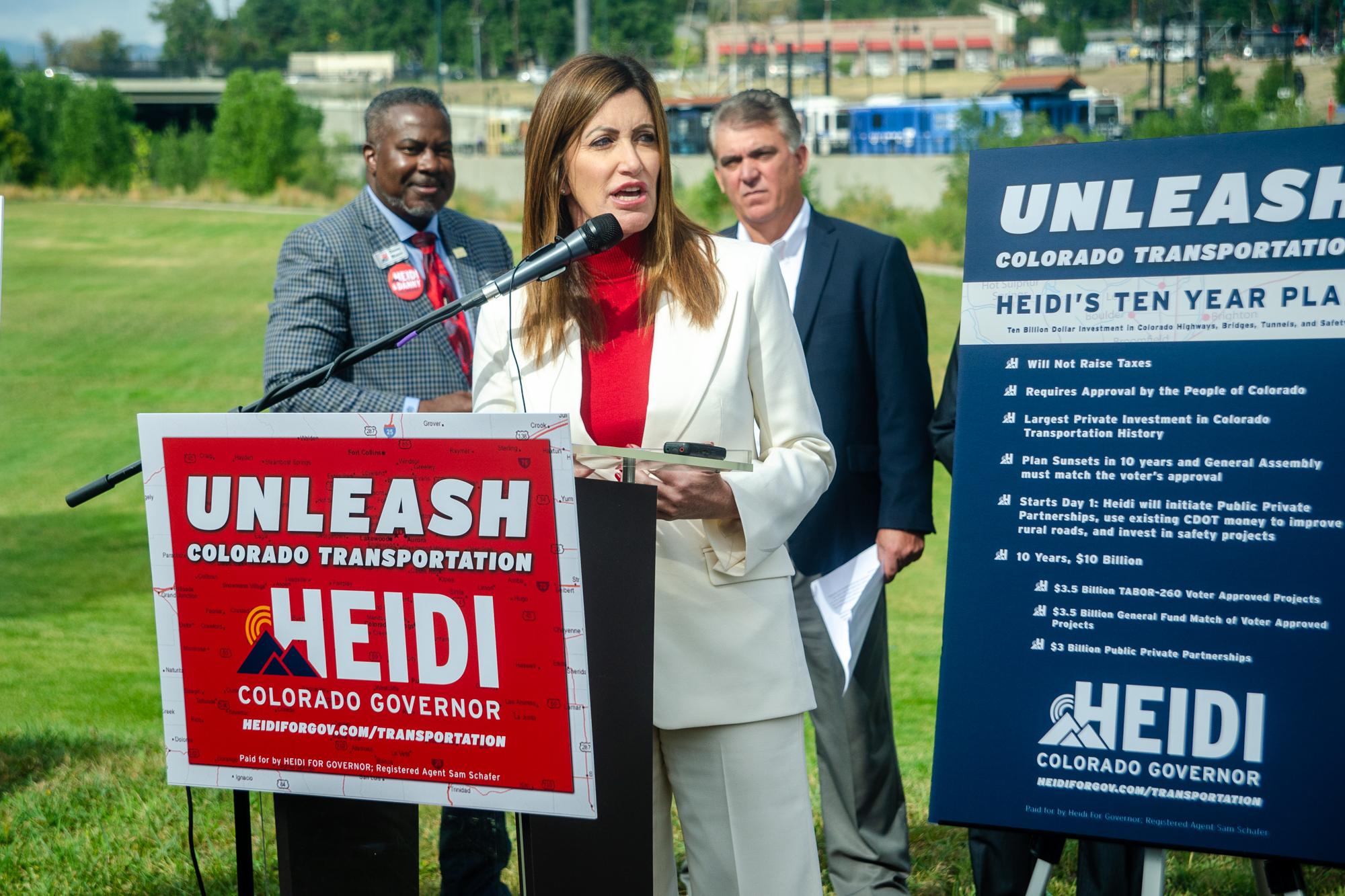
Republican gubernatorial candidate Heidi Ganahl unveiled her plan for Colorado’s transportation system on Thursday, calling for billions of dollars of new spending on highway expansions and pavement projects across the state.
She said the plan would make personal vehicular travel a higher priority for the state Department of Transportation than it is currently under Democratic Gov. Jared Polis.
“Jared Polis is stealing one of our basic freedoms,” Ganahl said at a press conference near CDOT headquarters in Denver. “Driving gives you the freedom to go where you want, when you want.”
Flanked by Republican state lawmakers and other supporters, Ganahl took aim at two Polis-supported policies that have shaped the state’s current transportation plans.
The first, a 2019 climate bill, aims to reduce greenhouse gas emissions by 90 percent by 2050. That bill has led CDOT and local governments to abandon a handful of highway expansions and road widenings to meet climate targets.
“Right now, inside this building, they’re attacking that freedom,” she added, referencing a Colorado Transportation Commission vote Thursday that approved CDOT’s newly shuffled 10-year list of projects.
The second is a 2021 transportation funding bill that will raise billions of dollars for roads, bridges, electric vehicle infrastructure and incentives, public transit, and other transportation projects through new fees. That bill, she said, sidesteps the state’s tax limitation law and spends too little on roads.
“He wants you to ride an electric bus everywhere, which is just not feasible for most Coloradans,” she said of the governor.
In reality, while Polis has supported significant funding boosts for electric vehicles, public transportation (except for RTD), and other climate-friendly transportation efforts, his Department of Transportation is in the middle of its own decade-long plan to spend billions of dollars on roads — including expansion projects.
Ganahl said her transportation plan wouldn’t raise taxes. But it would rely on new taxes.
At the heart of Ganahl’s $10 billion transportation plan is a ballot initiative that would be voted on in 2024. The measure would ask voters to repeal the 2021 transportation bill and its related fees on things like deliveries, ride-sharing services and gasoline and replace that revenue with new taxes that would mirror the fees.
“I'm taking this plan to the voters to get approval, and we will call them taxes as they are,” she said. “That's the key, it's just being honest and authentic and transparent with the people of Colorado.”
The transportation taxes in Ganahl’s proposal differ from the fees in the Polis-backed 2021 bill in a few important ways. First, the taxes would be temporary, sunsetting in 10 years. Second, there are significant restrictions on how fee revenue can be spent. Ganahl could more easily shift spending to road projects if the revenue came from taxes. Third, the taxes would be voter-approved. The fees in the 2021 transportation package did not require voter approval because of the way the law was written.
Any push to get statewide voter approval for a new transportation tax would likely prove difficult; the last attempt in 2018 failed by 19 points. The legislature’s ability to create fees without voter approval is a key reason why Democratic lawmakers used them in their 2021 bill.
“It’ll pass, don’t worry,” Ganahl said of her proposed ballot initiative. She did not say what her contingency plan would be if it failed.
Ganahl’s plan would also rely on $3 billion in public-private partnerships and $3.5 billion in state general fund allocations. She said she was “confident” the legislature could find that money despite her plans to eliminate the state income tax.
“If the people of Colorado are going to approve the funding from the voters, the general assembly must meet the people halfway,” she said.
Ganahl’s plan calls for miles of new toll lanes and would restore at least one highway expansion Polis’ CDOT has dropped.
Ganahl embraces toll lanes, which have been standard practice for CDOT for years. Her plan calls for continuous toll lanes from Castle Rock to Fort Collins, which would require widening Interstate 25 through the south side of the metro all the way to downtown. CDOT and the Denver Regional Council of Governments just backed away from a planned expansion for part of that stretch of highway.
Toll lanes would allow for more consistent travel times, Ganahl noted, and could be used by public transit buses. Ganahl and her supporters said public transit should be a choice for commuters — not thrust upon them.
“People in Colorado are being punished for driving in their cars,” Johnny Olson, a former CDOT executive who’s backing Ganahl, said at the press conference. “We don’t want that.”
Ganahl did not say whether she would support current bus rapid transit plans on arterial streets in the Denver area that may take away traffic lanes for personal vehicles.
In many ways, Ganahl’s proposal to expand high-profile highways mirrors Polis’. CDOT announced Wednesday that it has enough money to add toll lanes on two segments of I-25 between Denver and Fort Collins, which would result in a continuous toll lane between the two cities.
Polis’ CDOT also plans to expand Interstate 270 in Commerce City, which Ganahl erroneously said the agency was dropping. It also plans to expand Interstate 70 at Floyd Hill west of Denver and I-70 at Vail Pass.
A representative for the Polis campaign declined to comment. In a press release, the Colorado Democratic Party called Ganahl’s plan a “vague” collection of ideas.
“Heidi’s first plan is more like a wishlist … of things the Governor is already doing,” party spokesperson Kailee Stiles said in a release.









